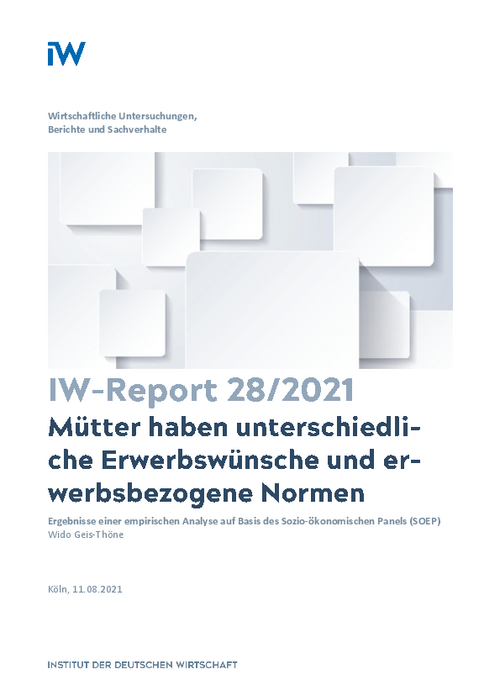In the last 20 years, the role models of mothers in Germany have changed to a great degree, as an evaluation of the Socio-Economic Panel (SOEP) shows.

Mothers Have Different Employment Desires and Employment-Related Norms

In the last 20 years, the role models of mothers in Germany have changed to a great degree, as an evaluation of the Socio-Economic Panel (SOEP) shows.
In 1998, 26.3 percent of women between the ages of 25 and 54 with minor or adult children did not want to pursue gainful employment; in 2018, this share was only 12.4 percent. In addition, a strong trend away from small part-time work of less than 20 hours a week and towards full-time or near-full-time part-time work can also be observed in the last decade. However, employment aspirations vary greatly with the socio-economic background. For example, 25.4 per cent of the mothers without a vocational qualification did not want to work in 2018, compared to 8.0 per cent of the mothers with a tertiary qualification. Such a traditional role model is also found particularly often among immigrant mothers and mothers with three or more children. Mothers with high-earning partners also want to work part-time more often and full-time less often, all other things being equal. Moreover, more than a quarter of a century after reunification, there is still such a strong East-West divide that the requirements for reconciling family and work must be classified as structurally different.
Not only the employment aspirations but also the employment-related norms of the mothers differ. This becomes clear, if one looks at the mothers' assessments on whether men and women should be employed and take care of the household and family to the same extent and on whether children under the age of three and under the age of six suffer from mothers' employment, both is also surveyed in the SOEP. For example, mothers with high-income partners are particularly likely to reject an equal division of tasks under otherwise equal conditions, and mothers without a vocational qualification, immigrant mothers and mothers with three or more children are particularly likely to see it as critical for the welfare of young children.
Even if the situation of these mothers is not very present in the public discourse, family policy must also offer supportive measures for them. Above all, it is important that they are made aware of the risks of their chosen employment biographies in case of separation and death or unexpected unemployment of their partner. In addition, when designing financial incentives for greater labour force participation, family policy should keep in mind the diversity of the realities of families' lives. Hence, they should not focus only on very specific employment constellations of parental couples – as in the case of the concept of family working time – but target broad groups. It should also be noted that existing obstacles must be dismantled. Above all, care services for children must be expanded to meet demand. However, this is of little help to mothers with older and adult children, who mostly also only want to work to a limited extent. Further scientific studies are necessary to determine how their significant potential of skilled labour can be raised for the labour market.

Mothers Have Different Employment Desires and Employment-Related Norms

More on the topic

The Regional Distribution of Graduates in Germany
Graduates in Germany are distributed very unevenly across the country. Taking the population aged between 35 and 44, who have generally already completed their higher education, in 2019 the highest proportions of university graduates were to be found in Berlin ...
IW
The Regional Distribution of Low-skilled Workers in Germany
Low-skilled workers in Germany are heavily concentrated in urban areas. In 2019, the proportion of 25- to 64-year-olds who had not completed at least two years of vocational training or higher education was almost twice as high in cities with a population of ...
IW